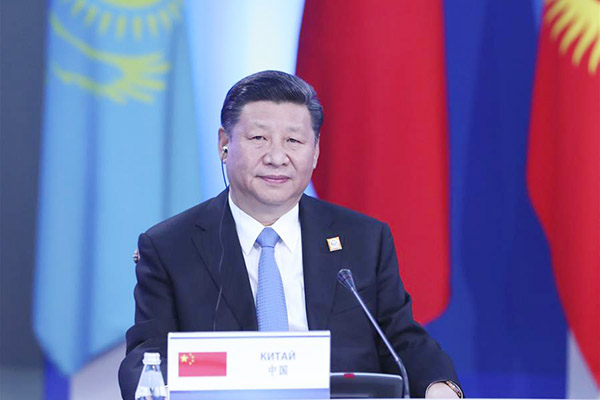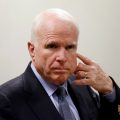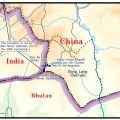
In his latest speech on Friday, President Xi Jinping highlighted China’s firm stance on fighting terrorism and safeguarding regional peace at a time when the world is facing more security challenges than ever.
Recent acts of terrorism show that the fight against the “three evil forces”-terrorism, separatism and extremism-remains a long and arduous task, Xi said in a speech at the Shanghai Cooperation Organization summit in Astana, capital of Kazakhstan. Xi wrapped up his four-day visit to the Central Asian country on Saturday.
“Without security, there would be no development to speak of,” he said.
Xi’s trip to Kazakhstan has added impetus to building the Belt and Road Initiative, cements the bond among countries for the community of shared future and opens up broad prospects for peace and prosperity in the region, Foreign Minister Wang Yi said on Saturday.
The president’s strong voice against the three evil forces has led to practical results. During the summit, the member states signed the SCO Convention on Combating Extremism. The leaders of the SCO countries also issued a declaration to jointly fight international terrorism.
Xi’s remarks came against the destabilizing backdrop of a series of recent terrorist attacks. The world is facing many uncertainties and people are expecting a brighter future despite their frustration with the current situation, the president said in a speech at the UN’s Geneva headquarters in January.
How is a safer world to be built? That’s the question Xi has elaborated on in many major diplomatic occasions, including the SCO summits, since he took office in 2013.
At the SCO summit in Astana, Xi pointed out that “destabilizing factors and uncertainties are on the rise”. China is willing to work together with all parties to “build a common home of security, stability, development and prosperity”, he said.
While addressing the UN’s Geneva headquarters in January, Xi urged all nations to build a world of common security for all.
“A country cannot have security while others are in turmoil, as threats facing other countries may haunt it also. When neighbors are in trouble, instead of tightening his own fences, one should extend a helping hand to them,” he said.
The notion of building a community of a shared future for all humankind, which was first put forward by Xi in late 2012, epitomizes the direction in which the Chinese government believes global governance should head.
In March, the UN Security Council for the first time incorporated this concept into its resolution on promoting security and stability in Afghanistan and the region, showing the global recognition the proposal has won.
Safeguarding peace
Xi’s firm stance on fighting terrorists and safeguarding peace has been translated into action by China in recent years, with the country making more contributions to improving global governance.
China, now the largest contributor to the United Nations peacekeeping force, has deployed more than 2,600 of the 88,000 “blue berets” in 10 peacekeeping missions in countries like South Sudan, Lebanon and Liberia.
China also uses multilateral platforms such as the Xiangshan Forum and the Shangri-La Dialogue to discuss security and defense cooperation with Asia-Pacific members and others.
In his keynote speech at the UN Geneva headquarters in January, Xi announced that China will provide an additional 200 million yuan ($29.42 million) in humanitarian assistance to help refugees and the homeless in the Syrian crisis.
In recent years, China has advocated talks between the countries directly concerned to address the maritime disputes in the South China Sea, pushed for an early resumption of the stalled six-party talks to end the Korean Peninsula nuclear conundrum, and helped achieve a landmark Iranian nuclear agreement in 2015.
China’s prescription
The Chinese president has pointed out on many diplomatic occasions that in fighting terrorists, countries should not just treat the symptoms, but remove the root causes.
“We should intensify counterterrorism efforts, address both the symptoms and root causes, and strive to eradicate poverty, backwardness and social injustice,” Xi said in a speech at the opening ceremony of the Belt and Road Forum for International Cooperation in Beijing last month.
“Development is the master key to solving all problems,” he added.
During his first state visit to Egypt, President Xi made a speech at the Arab League headquarters in Cairo, where he stressed “development” as the key to resolving most Middle East problems, especially growing terrorism and disorder.
Jin Yong, a professor of International relations at Communication University of China, said that the growth of terrorist activities will not be stopped except through development and creation of job opportunities.
“Unemployment and poverty are the main causes of terrorism worldwide,” he said, adding that the China-proposed Belt and Road Initiative could help remedy the rising risks of terrorism.
“Just as President Xi has said, we should focus on the fundamental issue of development in pursuing the Belt and Road Initiative,” he said.
Ruan Zongze, executive vice-president of the China Institute of International Studies, said that Xi’s proposal of “building a world of common security” shows that China is a responsible power in maintaining global peace and promoting cooperation.
Unlike many countries that turned to protectionism when facing global challenges, China advocates inclusive growth by pushing forward the Belt and Road Initiative, he said, adding that the initiative will inject impetus for global economic growth.


